Most Washingtonians are well aware of the rich legacy that lies in D.C.’s musical and cultural heritage. It is widely known throughout the region that there exists a singular funk sub-genre called “go-go.” Bestselling books have been written about the city’s influential punk and hardcore scenes. The D.C. roots of two of jazz’s greatest musicians, Duke Ellington and Jelly Roll Morton, have been celebrated. Yet recent times have turned a blind eye on some of the present day’s brightest stars. Pianist Allyn Johnson, among the most innovative musical technicians of the present day, is one whom the world has failed to recognize.
D.C. native Ben Williams has recently risen to the national spotlight, but like so many, he had to move to New York City before that could happen. While Johnson received breathless recognition early on, he never moved away in pursuit of the world stage. Instead, Johnson now stands as one of the most influential figures in the ongoing revival of his hometown’s jazz scene. Within the nation’s capital, he is known as both a performer who can draw capacity crowds to venues around the city and an educator whose position as the director of Jazz Studies at the University of the District of Columbia makes him a key player in the cultivation of D.C.’s next generation of torch carriers.
Johnson explains his commitment to his hometown: “I’ve never really wanted to be a part of the jazz industry, in a sense, because I never wanted to be the next young piano star. I’ve always just loved to learn to play this music. I play music that I like and that expresses what I feel.”
Born in D.C., Johnson began playing the piano at the age of five and honed his technical, intuitive and spiritual facilities as the pianist in his uncle’s church.
“I believe that my intuition probably developed from playing in church for many years,” Johnson said via email. “Church musicians might call this so-called intuition ‘flowing in the Spirit.’ So I try to always ride the wave of the Spirit of the Music. As long as it’s coming from an honest place, it will never steer you wrong.”
Johnson was mentored by the all-important legendary educator Calvin Jones at the University of the District of Columbia. But he did not originally start out on a path toward a music career. He began college at George Washington University as a pre-medical student. Upon hearing D.C. local legend pianist Dwayne Adell, his track was forever altered.
If you ask any D.C. jazz musician about Adell, you will hear stories of wonder and dismay. He is a musical autodidact with an uncanny ability to recall any musical passage, while expounding. He has also been known to perform difficult classical piano solos, and improvise off of them. Dwayne Adell has very little knowledge of written music, or theory.
After Johnson met Adell, the two began practicing together at UDC, where Adell was already studying with Dr. Jones. With Adell’s encouragement, Johnson decided to switch schools and change his major. In 1992, he joined the jazz program at UDC and eventually became Jones’ assistant.
Quamon Fowler (feat. the Young Lions), “Chelsea Bridge”
[audio:https://www.capitalbop.com/wp-content/uploads/2011/10/03-Chelsea-Bridge.mp3|titles=Chelsea Bridge]
Jones embodied the prototypical jazz musician and educator, through his years of experience as both a celebrated trombonist and as a teacher, first with the D.C. Public Schools and then at UDC. He was born in Chicago and raised in Memphis, and was steeped in the tradition of the blues. He performed with Muddy Waters and Count Basie, and was a member of Ray Charles’ big band, performing at many of the legendary theaters in Black America, including the Howard Theatre.
Jones also broke racial barriers through his and other musicians’ battles with the segregated musicians union. He was an influential force in the desegregation of the local D.C. chapter. Through his struggle, he became the first African American to perform in the orchestra at the National Theatre, as well as the infamously discriminatory Washington Redskins Professional Band. He was the founder of the jazz program at UDC, and composed much of the music for the jazz band.
With a mentor such as Jones, Allyn Johnson and others benefited from a substantial education in not only music, but in life. As a student, Johnson delved into the world of jazz – its community, its history and its place in today’s society. Jones’ inspiration prompted the young student to make education a part of his profession. Almost immediately after graduating from UDC, he became an adjunct professor there and an instructor at the Kennedy Center’s Betty Carter Jazz Ahead program. When Jones died in 2004, Johnson succeeded him as director of UDC’s jazz program.
In terms of musical development, Johnson has the best of both worlds – he is simultaneously a major jazz educator and a working musician on the scene. Traditionally, as practitioners of an African-American art form, jazz musicians developed their first musical faculties in the Church. It is there that a young musician first is introduced not only to the physical act of playing the instrument; it’s also where he can nurture that supremely important thing known as one’s personal “feel.”

Courtesy Allyn Johnson
Johnson also came of age in a time when, he said, “jazz education was taking off in colleges and universities around the U.S. and abroad.”
A product of and participant in jazz’s higher-education world, Johnson does acknowledge its downsides. “I think that jazz in a college atmosphere can only take you but so far,” he said. “If you want to really learn how to play a jazz gig, you have to go see live music, go to jam sessions, and talk to the jazz masters when they come to town. These are some of the things that I did and still do to this day. That’s where the inside information is.”
From Jones’s example, Allyn discovered that the best musical education is outside of the classroom in the real world. As Jones learned, the true essence of jazz is in the blues, and to learn the blues it must come intrinsically, and through hard life experience.
“You are not going to really learn how to play and express the blues only by playing in the four walls of a school or a practice room. You have to go hear some older musicians that’s never been to a conservatory, been strung out before, been homeless and has lived a little, to really understand how to express the blues,” Johnson said. “It’s not about how many degrees you have when you are on the bandstand, it’s about the music. The bandstand doesn’t care what title you have or letters you have behind your name. Can you play some music is all the bandstand is about! That’s my philosophy.”
Johnson’s style is his expression of that philosophy. With every note played on the piano, the influence of the blues is evident. Playing on a jazz standard, he might lag behind the beat, stretching out the swing feel into an almost drunken sway. In that, you might hear nods and musical references to a wide range of influences, from Thelonious Monk to Mcoy Tyner to Kenny Kirkland. At a recent performance, I heard him reference at least three pianists in one solo.
Johnson has the reputation of being one of the most versatile pianists in the D.C. region, and has leant his talent to stalwarts such as Hamiett Blueitt, Warren Wolf and Paul Carr. Armed with perfect pitch, Johnson has the ability to instantaneously adapt and respond to musical cues, even as he possesses the technical facility to elevate the sonic conversation. Most importantly, his inner self is expressed through the blues.
With all great jazz musicians, a strong sense of intuitive feel is central. Often, this is coupled with and developed through spirituality. Monk toured with a gospel troupe, and John Coltrane grew up with the music of his grandfather’s church before developing an affinity for Eastern spiritual perspectives later in life. Countless other legends in the Music developed the most important aspects of jazz sensibility through their sense of spirituality. Allyn Johnson is no different.
“The sense of Spirituality comes from a lifestyle of prayer and worship and commitment to the things that God wants from my life,” he said. “The obstacles I face are the same things everyone else faces … things that come with everyday living that challenge your flesh to take precedence over your spirit…. This relates to the music in that sometimes we want to show off some things we’ve been working on to other musicians or be in competition with other people. This is, in my opinion, being led by your flesh and not the spirit. The music should always be first.”
For Johnson, the life of a spiritual person puts everything in the correct perspective, especially the Music.
“For me, writing, playing, meditating are all the best way to stay in touch with Creator and with yourself,” Johnson said. “People will feel the honesty and transparency in your music. I like the way Charlie Parker said it: ‘If you don’t live it, it won’t come out of your horn.’ Or another way of putting that is, ‘Whatever you are, will come out of your instrument.’”
In a Bachian sense, Johnson sees himself fulfilling the original mission of a musician: to deliver God’s message through music. Though jazz is not overtly spiritual, or religious, the roots of the Music are undeniably sacred. Foregoing a detailed recounting of the history of African-American music, jazz is an outgrowth of the blues, which grew from gospel, which has its origins in Negro spirituals, which grew from traditional African sacred traditions. Johnson is a shining example of a contemporary jazz musician who is living the legacy of many who came before him.
His most overtly spiritual ensemble is Divine Order. This group features a vocal orchestra with a rhythm section, and includes an interchangeable array of instruments, including electric guitar and string or woodwind orchestra. The music is fully orchestrated and extremely dynamic, and showcases Johnson’s capabilities as an arranger and band director. Like the UDC jazz ensemble, Divine Order benefits from the leadership of a musician guided by the spirit.
In listening to Johnson, it is clear that he is an exceptional player with an array of “tricks” in his arsenal. However he always uses his intuition, his ear, to determine the best mode of operation in an ensemble. He is not afraid to sparsely complement horn solos, take short piano solos, or lay out entirely. Even though he is regarded by many in the D.C. region to be a great contemporary pianist, he is humble, and it shows in his ensemble playing.
In the late 1990s, Johnson joined a group calling itself the Young Lions. The band took its name from the jazz world’s much-used term, which denotes rising stars who pick up the mantle from past greats. Although not as strictly traditionalist as many who earn the appellation, the group lived up to its name.
“[T]he Young Lions actually was started by Baltimore drummer Quincy Phillips while he was at Howard University. The first edition of the Young Lions were all HU cats. When all those musicians went back home after graduating, Quincy asked me and Baltimore bassist Kris Funn to be a part of a new edition of the Young Lions,” Johnson recalled.
A YouTube compilation of Johnson’s solos during a gig at Twins Jazz:
As a name, the Young Lions carries a lot of weight. It was an album released in the 1960s by the “next generation” of that day: Lee Morgan, Frank Strozier, Wayne Shorter, Bobby Timmons, Bob Cranshaw, Louis Hayes and Albert “Tootie” Heath. Then in the bop resurgence of the 1980s, the term was used to market the neo-traditionalist music community led in part by trumpeter Wynton Marsalis. For the D.C. edition, the meaning is simple, and clear: A group of young, talented jazz musicians performing a raw, distinctive and hard-swinging brand of jazz. For Quincy, Kris and Allyn, however, the outlook on the Music is not so myopic.
At any Young Lions performance, you are just as likely to hear a swinging jazz standard as you are to hear a fusion burnout, or a completely improvised groove morphed into swing, rock, Afro-Cuban rhythm and everything in between. Their brand of jazz melds the urbane mood of the 1990s with the forward-thinking experimental spirit of the bebop era, resulting in an ever-compelling group with enough fire to revive a cultural corridor.
“I believe we began to create a scene on U Street, along with some other groups in the area, by playing … consistently during the week at Café Nema, Bohemian Caverns and Twins Jazz,” Johnson said. “Of course, we were not solely responsible for the revitalization of jazz in D.C., but we played a major role in it.”
As it is well known, jazz’s culture and community have changed drastically in recent decades. Even as more higher education programs emerge, more jazz venues close. There are fewer venues in cultural hubs such as Philadelphia, New Orleans and New York City – not to mention D.C. – that choose to offer jazz. The results have been detrimental not only to jazz musicians, but to the culture that surrounds the Music. There are fewer places to hear live instrumental music of any sort, and the DJ now reigns supreme in most live entertainment venues.
“Today there are not many places that have jam sessions,” Johnson said. “Jam sessions are where I learned a lot of music and listened to the way other musicians approached standard tunes. But it seems with the popularity of jazz education, young musicians don’t come out to play and hang out no more.”
It is encouraging to note once again that Johnson is himself a jazz educator, and he is in a position to teach young musicians these important concepts about the music, where it is and where it needs to go.
Despite his incredible sense of history, spirituality and feel in his playing of jazz, Johnson remains a virtual unknown outside D.C. A rite of passage in almost any American jazz musician’s career is the move to New York City, the music’s bustling cultural capital. New York is the place where jazz music as an art form is most accessible to audiences, and where the jazz industry as a business is most accessible to musicians. As a result, jazz musicians operating outside the auspices of the New York market are much less likely to gain wider recognition outside of their respective locales.
But for Johnson and countless other provincial musicians around the country, that option is neither practical nor appealing. As a result, Johnson has more than cemented his place as one of the best pianists D.C. has ever heard – and one of the best the world never has.
“I appreciate the love that the D.C. jazz community has given me over the years, but again, I only play music because I love it — not to be famous or even the best,” he said. “I’m striving to be the best that I can be. I honestly got tired of hearing certain club owners in D.C. giving musicians from New York more respect than they give their own. I wanted to prove that you didn’t have to move to New York to be a good musician, and that’s why I stayed here.”
Though Johnson may be an unsung hero, he is in great company with others from the D.C. area. Local legends like bassist Butch Warren and saxophonists Charlie Rouse and Buck Hill, have, like Allyn, shared the stage with some of the best musicians of their time. For whatever reasons, the jazz industry and the larger music world forgot these legends and the countless others who made impacts on their own communities.
But in sticking around, Johnson has not only developed a great reputation; he has helped to build a community around jazz. As a key instructor in the area with an insider’s view of the Music, he is nurturing generations of future stars. It is through them that his name will become further recognized and celebrated, both within D.C. and throughout the world’s jazz community. ![]()

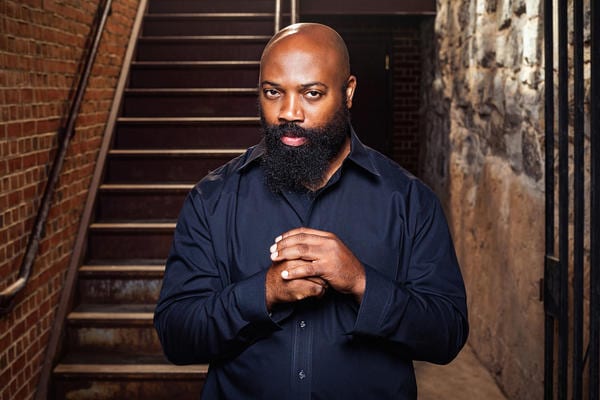
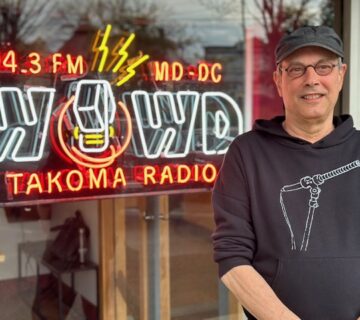
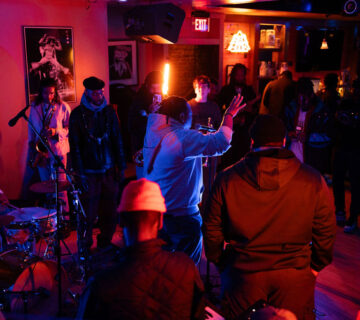
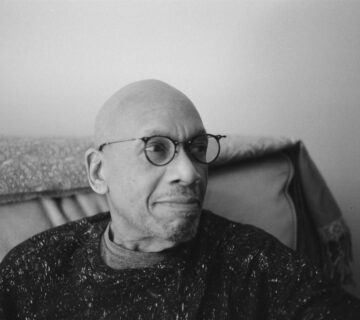
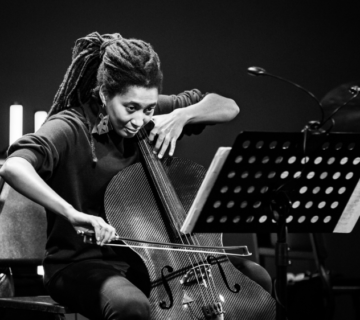
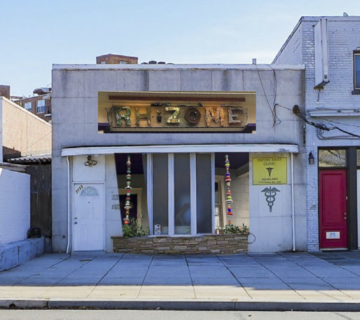
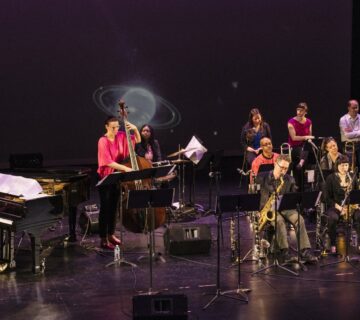
I saw Allyn recently with his trio at Vicinos and I was very satisfied that my evening was welll spent. Humble, kind and friendly, Allyn seems to know and do much without having to always talk about it or be the louddest voice in the room, Some people could learn from that – me included.
PREACH!
yup:)
[…] Johnson, a dean of D.C. jazz piano, brings his group Sonic Sanctuary to Bohemian Caverns this weekend. It’s sure to be worth the […]
Hello Allyn! I would love to purchase your piano book on the things you practice. Please direct me on how I can get it. God Bless!